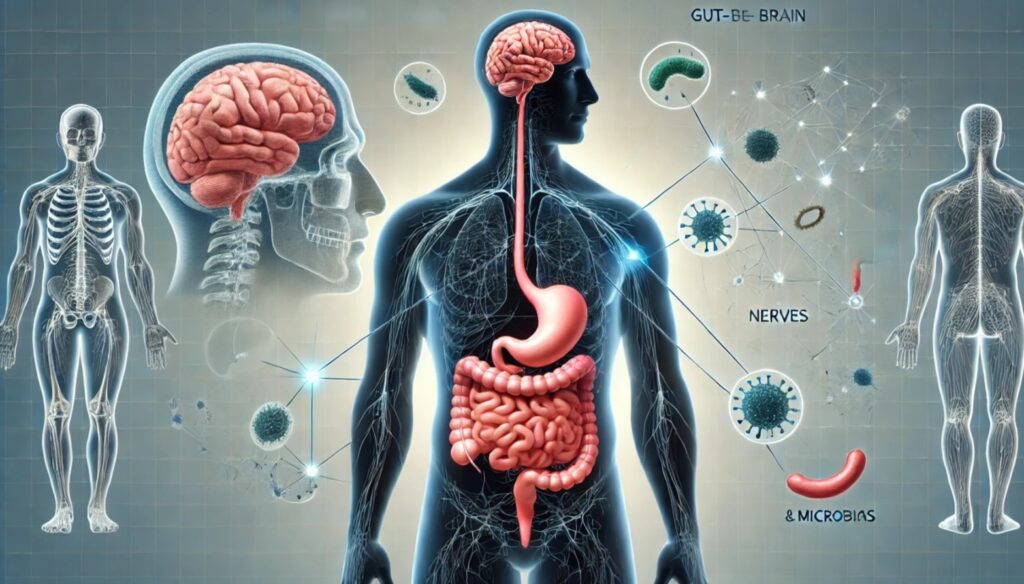For centuries, humans intuitively recognized the connection between gut health and overall well-being, often describing experiences such as “gut feelings” or “butterflies in the stomach.” Modern science has recently confirmed that these sensations aren’t mere metaphors but reflect a deep and complex relationship between our digestive systems and brains—an intricate interplay known as the “gut-brain connection.” This comprehensive guide explores how this fascinating relationship influences our physical, mental, and emotional health.
Understanding the Gut-Brain Axis
The gut-brain axis refers to the direct line of communication between the digestive tract and the central nervous system. This two-way communication system consists of nerves, hormones, neurotransmitters, and microbiota—the trillions of microorganisms, including bacteria, fungi, and viruses, inhabiting our intestines. Collectively, these microbiota, known as the gut microbiome, play a crucial role in influencing brain functions, immunity, and overall health.
The Importance of the Microbiome
Your gut microbiome is like a bustling city of microbes, each playing unique and essential roles. Healthy gut bacteria assist digestion, synthesize vitamins (such as B12 and vitamin K), regulate metabolism, strengthen the immune system, and maintain the integrity of the gut lining. An imbalance in these microbes, termed dysbiosis, has been linked to numerous health issues, including obesity, diabetes, autoimmune disorders, and even neurological conditions like depression, anxiety, and Parkinson’s disease.
The Second Brain: Your Gut’s Own Nervous System
Your digestive system houses a vast network of neurons, collectively referred to as the Enteric Nervous System (ENS), often called the body’s “second brain.” The ENS consists of over 100 million neurons, remarkably similar to the spinal cord, independently controlling digestive processes like peristalsis (muscle contractions), nutrient absorption, and blood flow within the intestines. The ENS communicates constantly with your central nervous system through the vagus nerve, shaping emotional responses, stress levels, and mental clarity.
How Gut Health Influences Mental Health
Emerging evidence highlights how strongly gut health impacts mood and emotional well-being. Approximately 90% of serotonin, the neurotransmitter crucial for mood regulation, sleep patterns, and emotional stability, is produced in the gut. Disturbances in gut health directly affect serotonin levels, contributing to anxiety, depression, and other mood disorders. In recent studies, people with depression and anxiety often exhibit an altered gut microbiome compared to those without such conditions.
Moreover, probiotics (beneficial bacteria found in fermented foods or supplements) have shown promise in alleviating symptoms of depression and anxiety, further strengthening the gut-brain hypothesis.
Diet and Gut Health: Eating for a Healthy Mind
Nutrition profoundly shapes the gut microbiome. Diets rich in fiber, fruits, vegetables, fermented foods, and whole grains promote diverse, healthy microbiota populations, reducing inflammation and enhancing overall well-being. Conversely, high consumption of processed foods, sugars, saturated fats, and artificial additives disrupts the gut balance, leading to chronic inflammation and disease risks.
Specific dietary patterns, such as the Mediterranean diet—rich in vegetables, fruits, lean proteins, whole grains, and healthy fats—are consistently linked to improved mental health outcomes and lower risks of cognitive decline. These dietary choices help maintain gut integrity, support beneficial bacteria, and lower systemic inflammation, improving mental resilience and emotional balance.
The Impact of Stress on Gut Health
Stress exerts significant negative effects on gut health. Chronic stress disrupts gut bacteria balance, compromises the gut lining (often called “leaky gut”), and triggers inflammatory responses. Over time, this heightened inflammation and disruption in gut integrity increase vulnerability to anxiety, depression, digestive disorders like Irritable Bowel Syndrome (IBS), and inflammatory bowel diseases such as Crohn’s and ulcerative colitis.
Stress-management techniques, including mindfulness, meditation, yoga, and regular physical activity, can positively affect gut microbiota, reducing inflammation, restoring balance, and consequently improving both mental and digestive health.
The Role of Sleep in Gut Health
Quality sleep significantly influences gut health, and vice versa. Research indicates that inadequate sleep patterns can dramatically alter gut bacteria, reducing beneficial strains and increasing harmful ones. Conversely, a healthy gut microbiome enhances sleep quality by regulating circadian rhythms and neurotransmitter production, underscoring a crucial two-way relationship.
Practicing good sleep hygiene—consistent sleep schedules, reducing screen time before bed, and creating a calm sleeping environment—supports gut health and, in turn, contributes to better cognitive function, emotional stability, and physical well-being.
Probiotics, Prebiotics, and Postbiotics: Supporting the Gut-Brain Connection
Probiotics are beneficial live bacteria and yeasts, commonly found in foods like yogurt, kefir, sauerkraut, kimchi, and kombucha. Prebiotics, on the other hand, are fibers that nourish these helpful bacteria, found in foods such as garlic, onions, asparagus, and bananas. Combining probiotics and prebiotics (known as synbiotics) can further enhance gut health and mood regulation.
Recently, a third class known as postbiotics—beneficial byproducts produced by probiotics during fermentation—has gained attention. These substances, like short-chain fatty acids (SCFAs), have anti-inflammatory properties and support gut integrity and brain health, representing promising therapeutic potential in the future.
The Future of Gut-Brain Research
Researchers continue uncovering deeper insights into how the gut-brain axis influences our health. Advanced studies explore therapies targeting gut microbiota to treat mental illnesses, neurological diseases, and even neurodegenerative conditions such as Alzheimer’s. Personalized medicine approaches, including customized probiotics and individualized dietary interventions based on microbiome analysis, promise exciting potential in revolutionizing healthcare in the coming decades.
Caring for Your Gut to Enhance Your Life
The profound connection between the gut and the brain highlights the importance of nurturing gut health as a foundation for overall wellness. By making mindful dietary choices, managing stress effectively, prioritizing quality sleep, and incorporating gut-friendly foods and probiotics into your routine, you can significantly enhance mental clarity, emotional balance, physical vitality, and overall resilience. Understanding and respecting the intricate ecosystem within your digestive tract empowers you to achieve a healthier, happier life.

